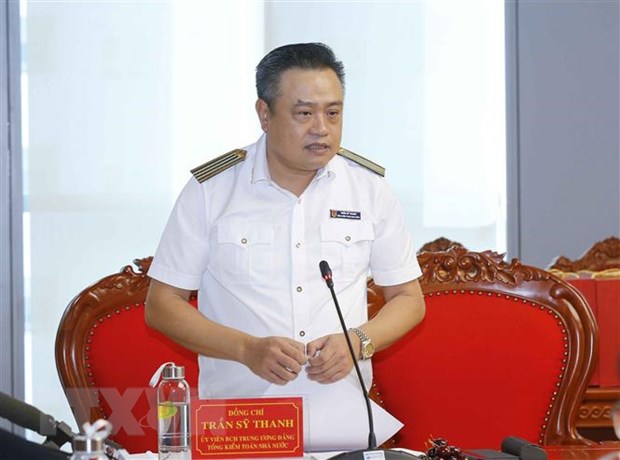 Politics & Law
Politics & Law


|
| State Audit General Trần Sỹ Thanh. — VNA/VNS Photo |
HÀ NỘI — The Hanoi Declaration's key message was “Environment Audit for Sustainable Development”. This mantra has become an important part of the Asian Organisation of Supreme Audit Institutions (ASOSAI) strategic vision for future development, with the aim of achieving the 2020 programme on the Sustainable Development Goals (SDGs) of the UN.
The declaration was adopted at the 4th ASOSAI General Assembly, hosted in 2018 by the State Audit Office of Việt Nam.
State Audit General Trần Sỹ Thanh said that with the role as Chair of the ASOSAI for 2018-2021 term, the State Audit Office of Viêt Nam initiated a special research committee to set up the Working Group of ASOSAI on implementing sustainable development goals at the 54th meeting of the Governing Board in July, 2019.
This was a pioneer proposal of ASOSAI among the International Organisation of Supreme Audit Institutions (INTOSAI), contributing to successfully implementing the Hanoi Declaration.
During the 2020-2022 period, the ASOSAI has implemented the Cooperative Audit Programme on SDGs with the theme of a strong and resilient national public health system, following the comprehensive and closed model of sustainable development with the participation of 26 Asian countries and three others from the Asia Pacific region.
The programme aims for more equal access to public health systems and prioritisation for vulnerable groups such as women, people with disabilities and the poor.
This is particularly important in the context of the COVID-19 pandemic which has caused crises across the globe with unpredictable consequences.
The ASOSAI has also strived to promote cooperative audits and research plans through the ASOSAI Working Group on Environmental Auditing (WGEA). In 2020, the group carried out a cooperative environmental audit, chaired by the State Audit of Việt Nam, on water management of Mekong River Basin in line with the SDGs and a sustainable traffic audit, as well as starting a research plan on green financial auditing.
Its member SAIs have conducted some 84 environmental audits covering a wide range of environmental issues, including air quality, maritime and water resources management; waste treatment, management of medical waste and imported scrap; renewable energy; and natural conservation, prevention of desertification and soil degradation, climate change and biodiversity; and others.
It can be seen those audit topics put forward after the adoption of the Hanoi Declaration have significant meaning in bringing in value and interests for the people such as improving healthcare efficiency and providing social welfares, developing the public education sector sustainably, ensuring sustainable food security and managing national finance sustainably.
Dealing with global environmental challenges
According to State Audit General Thanh, environmental audits have helped governments to apply stronger measures in a timely manner to protect ecological systems, raising awareness of authorised agencies in tackling related issues more seriously and creating conditions for the issuance, amendment and completion of the legal system and policy framework regarding the environment.
These audit programmes and plans have created huge impacts on the operational efficiency of member SAIs via the promotion of knowledge sharing and support for member SAIs to build professional capacity.
Member SAIs will become more proactive in coping with emerging challenges and emergency situations. They have all endeavoured to overcome the difficulties of the pandemic and affirmed a commitment to a stronger ASOSAI, and a greener Asia, through sustainable development. — VNS




